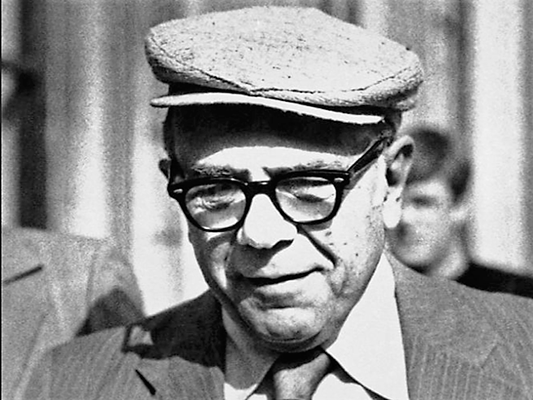Angelo Bruno

Born: May 21, 1910, Villaba, Italy
Died: March 21, 1980, Philadelphia, Pennsylvania
Nicknames: The Docile Don, The Gentle Don
Associations: Carlo Gambino, Antonio “Tony Bananas” Caponigro, “Little Nicky” Scarfo, “Long John” Martorano
Nicknamed “The Docile Don” for using violence only as a last resort, Angelo Bruno was the Philadelphia Mafia’s nationally respected and notoriously low-key boss for two decades. In 1980, his assassination set the long-stable crime family careening off the rails into chaos and carnage-soaked conflict for the next 20 years.
Born Angelo Annaloro in Sicily, Bruno came to the United States in the 1920s during the height of Prohibition and joined the Philly Mob organization led by Salvatore Sabella. When Sabella was deported, Bruno went to work for the city’s newly formed Cosa Nostra family. He quickly rose in the ranks to caporegime status, leveraging important New York contacts to his advantage during his ascent. One of his closest friends and allies in the underworld was powerful New York godfather Carlo Gambino, the unofficial head of the Commission, the Mob’s de facto board of directors.
Joe Ida, then don of the Philly Mob, stepped down and fled to Italy after a narcotics indictment and his arrest at the famously botched 1957 Apalachin Mafia summit in upstate New York. Ida named Antonio “Mr. Miggs” Pollina, a one-time friend of Bruno’s, as his successor. Shortly into his brief reign, Pollina worried that Bruno was too popular and decided to kill him. He placed a murder contract on his head and gave it to his newly appointed underboss, Ignazio Denaro, to make the arrangements.
Denaro decided to tip off Bruno instead. Bruno traveled to New York and used his relationship with Gambino to seek the Commission’s help in calling off the hit. The Commission ordered Pollina to step down and Bruno to replace him. They also gave the newly christened boss the freedom to choose Pollina’s punishment. Bruno spared his life and simply demoted him to the rank of soldier, an act of mercy that earned him his nickname.
Bespectacled and balding, Bruno gained his own seat on the Commission and assumed command of large swaths of labor union, loansharking and gambling territory throughout Pennsylvania and New Jersey. He extended his reach and strength by forging alliances with African American, Irish and motorcycle gang factions in the Philly underworld.
Bruno publicly ranted against the “junk” business, prohibiting members of the crime family from selling illegal drugs. But privately Bruno made millions from narcotics transactions carried out by certain exempt members of his inner circle. Included were a group of Gambino’s Sicilian cousins, who were allowed to set up shop in Cherry Hill, New Jersey, minutes outside Philadelphia and squarely in Bruno’s domain. This double standard caused a simmering resentment boiling beneath the surface from some of his key lieutenants and fellow syndicate leaders throughout the 1970s.
More resentment grew from Bruno’s decision to steer away from a full-on assault on the casino boom in Atlantic City when gambling became legal there in 1976. That turf traditionally belonged to the Philly Mafia, but some of Bruno’s troops thought he was far too eager to welcome other crime families into the fold, especially the New Yorkers. By the decade’s end, the situation was coming to a head.
The machinations of deceit began swirling around Bruno in late 1979 when his consigliere, Antonio “Tony Bananas” Caponigro, began plotting a coup. A well-known sociopath stationed in Newark, New Jersey, Caponigro had risen to a top position in Bruno’s crime family only a few years earlier.
On the evening of March 21, 1980, Bruno dined at his favorite Italian restaurant in South Philadelphia, the epicenter of Mob activity in the City of Brotherly Love, and was driven home by a bodyguard, John Stanfa. Bruno had brought Stanfa, a native Sicilian with strong ties to Gambino, into his organization at the late godfather’s behest, which would ultimately aid in his undoing.
Bruno was sitting in Stanfa’s car smoking a cigarette in front of his nondescript South Philly row house when Stanfa gave a signal for the assassin to move in. The killer, either Caponigro or someone hired by him, snuck up to the vehicle with a shotgun in hand, put it behind Bruno’s ear and pulled the trigger. The relatively peaceful 20-year period in the Philly Mob came to a bloody end.
The next two decades were turbulent for the Philadelphia crime family. The unrest was immediate, resulting in multiple wars and more than 30 murders. Caponigro was tortured and executed in New York in the weeks that followed, payback from the Commission for the unsanctioned murder of a boss.




